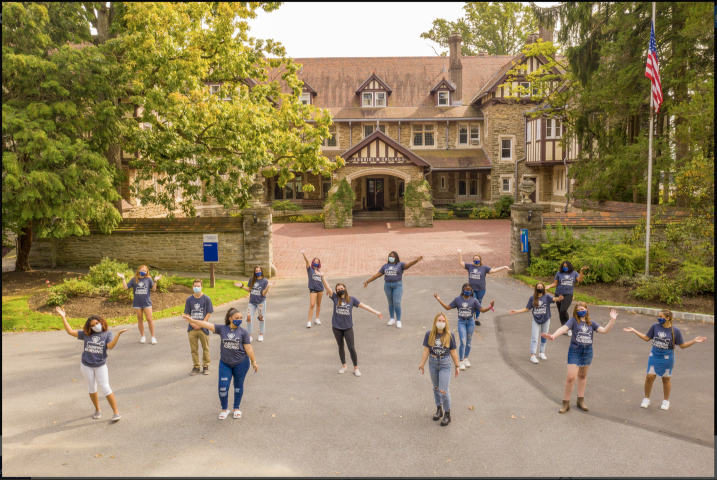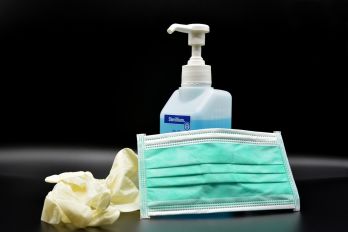
Photo by Pixabay
Cabrini University announced on Friday, Jan. 22 via email that all returning students must acquire a negative COVID-19 test in order to move back on campus in the upcoming weeks. Students were given the option to test at Cabrini University on three separate occasions, or test on their own but had to meet certain criteria.
About the Tests
“The goal of testing residential students is to prevent [the] spread of the virus on campus,” Dean of Students and COVID-19 Task Force Chair Stephen Rupprecht said. “Residential students accounted for more than 75% of positive COVID-19 cases in the fall semester [of 2020], and these students represent the greatest risk for spread.”
Cabrini students were not required to make a payment for tests if they chose to test on-campus. Rupprecht explained that the university is covering the costs of all on-campus testing and was able to get funding assistance through the Higher Education Emergency Relief Fund.
“I think it is smart to test people,” Selena Scialfa, a graduate student in special education with autism endorsement, said. “We are a Cabrini family and should keep each other safe. During a pandemic, we should be testing and catch people who are positive so that Cabrini can stop the spread.”
The university allotted three separate days in which students can make an appointment to have a test on campus. The testing days were within a day of each other and exactly one week prior to the new move-in date Feb. 15. Students were asked to refrain from eating, drinking, smoking and chewing gum half an hour before their testing time. Students were also asked to continue to quarantine to their best of their ability between the end of their test and move-in day.
Cabrini University is not the only campus requiring testing before entering campus. Villanova University asked all faculty and staff to be tested prior to continuing in-person classes on campus. West Chester University requires all students to test weekly in order to slow the spread. Lafayette University requires a weekly COVID-19 screening test for all students and employees who work on campus two or more days a week. Eastern University asked all residential students to test on campus the day of move-in.

Photo by Cabrini Flickr
Questions and Concerns
Some students expressed their concern about the COVID tests only being directed towards residents and not commuters, faculty and staff or anyone freely entering and leaving campus on a daily basis.
“I don’t understand this,” junior communications major Grace Fox said. “People that are commuters should also have to get tested because we don’t know where they have gone to or if they have been smart so if there is a spread around campus it might be coming from them.”
While this is a factor that needs to be considered, Rupprecht states that the greatest risk for the spread of COVID-19 on campus is the residential students.
“Faculty and staff accounted for minimal risk of virus spread,” Rupprecht said. “Commuter students who are not student-athletes made up only 8% of positive cases from the fall with little to no risk of spread to our campus community.”
Another factor that needs to be considered was the accuracy of the COVID-19 tests. According to the Centers for Disease Control and Prevention, it is possible to test negative and then later test positive on a viral test. There are two instances where this can happen:
- An individual tested too early in the infection and can then test positive later during this illness
- An individual could also be exposed to COVID-19 after the test and could then get infected
“Any effort to test asymptomatic persons carries the risk of the window of time between testing and any future behavior,” Rupprecht said. “All of our residential students were asked to quarantine between the time of testing and their move-in date, to the extent possible. While this gap in time still raises some concerns, we believe the benefit of identifying unsuspecting infection outweighs any perceived or real risk.”
There were some students who chose to move out completely after the fall semester of 2020 and there were some students who moved out during winter break before the start of the spring semester of 2021. Both instances prompted a refund.
“Any time a resident student chooses to change their housing status from resident to commuter, the student is refunded based on the current refund schedule,” Rupprecht said. “Typically the student would always be refunded 100% so long as they cancel and move out prior to the first day of occupancy.”
The pandemic and the now required testing are not the only reasons to prompt a student to change from a resident to a commuter.
“It is not easy to attribute student decisions to not live on campus to any one action,” Rupprecht said. “Many times these decisions are driven by finances. I am not aware at this time of any student who is choosing not to live on campus because of the testing requirement.”
A Look Ahead
Be aware that this is not the only time the university will be conducting COVID-19 testing. The university will have random surveillance testing to ensure the prevention of the spread of the virus in the upcoming weeks.
“Our plan is to test 10% of our resident population weekly,” Rupprecht said. “Student-athletes will be tested per the guidelines provided by the NCAA.”
Furthermore, the university will continue to follow the recommended CDC guidelines for institutions to reduce the spread of the virus on campus. Such guidelines include isolation, wearing masks, the use of hand sanitizing stations, etc.
“The same mitigation measures that were in place at the end of the fall semester remain in effect for the spring, including no guests in the residence halls, take-out dining only, required mask-wearing, and social distancing, including avoiding in-person gatherings,” Rupprecht said
These guidelines have been put in place for the safety of not only the students but also the faculty and staff on campus. Junior communication major Michael Firuta expressed his concern for other’s safety on campus and the importance of wearing a mask.
“Some people don’t realize that a negative test does not give you an excuse to not wear a mask,” Firuta said. “There are some people at Cabrini who prefer their friends wear masks and some who don’t. The purpose of the mask is to protect the person next to you and I strongly encourage those who meet with friends to put their mask on if they are not 100% comfortable.”

Photo by Pixabay
“Our on-campus mitigation measures were instrumental in limiting virus transmission within the campus community,” Rupprecht said. “Our employees did an excellent job demonstrating their compliance with mitigation efforts. Adherence to mitigation measures has been demonstrated to better protect against the spread of COVID-19 than testing alone. Our collective focus must remain on social distancing and mask-wearing.”
In order to look forward to the spring semester, it is important for the university to assess the successes and struggles brought by the fall 2020 semester.
“Cabrini continues to measure our success against predetermined metrics that includes current positivity rates and current rates of occupancy for quarantine and isolation housing,” Rupprecht said. “We remained at or below all concerning metrics throughout the fall thanks to the cooperation of everyone in our community. That cooperation, that adherence to all mitigation measures, will need to continue this spring to get us to Commencement in May. If we see rises or spikes in any metrics that would cause concern, we will assess the situation and make the appropriate decision in the best interest of Cabrini and our community.”
For more information about COVID-19, visit the CDC website and if you are feeling any COVID-19 symptoms, call your local health care provider.


